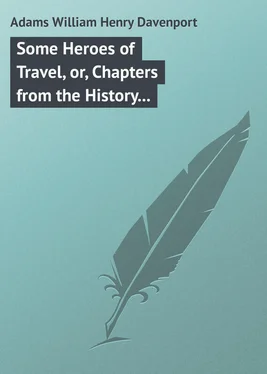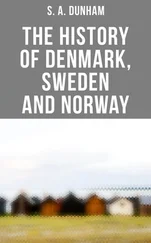William Adams - Some Heroes of Travel, or, Chapters from the History of Geographical Discovery and Enterprise
Здесь есть возможность читать онлайн «William Adams - Some Heroes of Travel, or, Chapters from the History of Geographical Discovery and Enterprise» — ознакомительный отрывок электронной книги совершенно бесплатно, а после прочтения отрывка купить полную версию. В некоторых случаях можно слушать аудио, скачать через торрент в формате fb2 и присутствует краткое содержание. Жанр: foreign_language, foreign_prose, на английском языке. Описание произведения, (предисловие) а так же отзывы посетителей доступны на портале библиотеки ЛибКат.
- Название:Some Heroes of Travel, or, Chapters from the History of Geographical Discovery and Enterprise
- Автор:
- Жанр:
- Год:неизвестен
- ISBN:нет данных
- Рейтинг книги:3 / 5. Голосов: 1
-
Избранное:Добавить в избранное
- Отзывы:
-
Ваша оценка:
- 60
- 1
- 2
- 3
- 4
- 5
Some Heroes of Travel, or, Chapters from the History of Geographical Discovery and Enterprise: краткое содержание, описание и аннотация
Предлагаем к чтению аннотацию, описание, краткое содержание или предисловие (зависит от того, что написал сам автор книги «Some Heroes of Travel, or, Chapters from the History of Geographical Discovery and Enterprise»). Если вы не нашли необходимую информацию о книге — напишите в комментариях, мы постараемся отыскать её.
Some Heroes of Travel, or, Chapters from the History of Geographical Discovery and Enterprise — читать онлайн ознакомительный отрывок
Ниже представлен текст книги, разбитый по страницам. Система сохранения места последней прочитанной страницы, позволяет с удобством читать онлайн бесплатно книгу «Some Heroes of Travel, or, Chapters from the History of Geographical Discovery and Enterprise», без необходимости каждый раз заново искать на чём Вы остановились. Поставьте закладку, и сможете в любой момент перейти на страницу, на которой закончили чтение.
Интервал:
Закладка:
W. H. Davenport Adams
Some Heroes of Travel / or, Chapters from the History of Geographical Discovery and Enterprise
PREFACE
The present age is sometimes described as an Age of Commonplace; but it has its romance if we care to look for it. Assuredly, the adventures of its travellers and explorers do not lose in importance or interest, even when compared with those of their predecessors in days when a great part of the world was still “virgin ground.” In the following pages, this thesis is illustrated by a summary of the narratives of certain “Heroes of Travel” belonging to our own time; and I believe it will be found that for “stirring scenes” and “hair-breadth escapes” they vie with any which the industrious Hakluyt, the quaint Purchas, or, coming down to a later date, the multifarious Pinkerton has collected. However, on this point the reader has an opportunity of satisfying himself, as, by way of contrast, I have prefixed to these Episodes of Recent Travel a succinct account of the enterprise of Messer Marco Polo, the Pioneer of Mediæval Travellers.
There is no pleasanter mode of learning geography than by studying the works of distinguished travellers; and therefore this little book may claim to possess some slight educational value, while primarily intended to supply the young with attractive but not unwholesome reading. The narratives which it contains have been selected with a view to variety or interest. They range over Mexico, Western Australia, Central Africa, and Central Asia. They include the experiences of the hunter, the war correspondent, and the geographical explorer; and, in recognition of the graceful influence of women, of a lady traveller, who showed herself as resolute and courageous as any of the so-called hardier sex. And, finally, they have the merit, it is believed, of not having appeared in previous compilations.
As a companion for the fireside corner, this little book will, I hope, be welcome to all English-speaking lads and lasses, who will learn from its pages how much may be accomplished by patience, perseverance, and energy.
SIR MARCO POLO, THE VENETIAN, AND HIS TRAVELS IN ASIA
We should be inclined to consider Sir Marco Polo as one of the greatest travellers the world has ever seen. It is true he was not a man of genius; that he was not, like Columbus, inspired by a lofty enthusiasm; that he displayed no commanding superiority of character. But when we remember the vast compass of his journeys, and the circumstances under which they were carried out; when we remember, too, how close an observer he was, and how rigidly accurate, and his plenitude of energy and perseverance – we feel that he is, beyond all cavil or question, entitled to be recognized as the king of mediæval travellers. Let us take Colonel Yule’s summary of his extraordinary achievements: —
“He was the first Traveller to trace a route across the whole longitude of Asia, naming and describing kingdom after kingdom which he had seen with his own eyes; the Deserts of Persia, the flowering plateaux and wild gorges of Badakshan, the jade-bearing rivers of Khotan; the Mongolian steppes, cradle of the power that had so lately threatened to swallow up Christendom; the new and brilliant Court that had been established at Cambaluc: the first Traveller to reveal China in all its wealth and vastness, its mighty rivers, its huge cities, its rich manufactures, its swarming population, the inconceivably vast fleets that quickened its seas and its inland waters; to tell us of the nations on its borders, with all their eccentricities of manners and worship; of Tibet, with its sordid devotees; of Burma, with its golden pagodas and their tinkling crowns; of Laos, of Siam, of Cochin China; of Japan, the Eastern Thule, with its rosy pearls and golden-roofed palaces: the first to speak of that Museum of Beauty and Wonder, still so imperfectly ransacked, the Indian Archipelago, source of those aromatics then so highly prized and whose origin was so dark; of Java, the Pearl of Islands; of Sumatra, with its many kings, its strange costly products, and its cannibal races; of the dusky savages of Nicobar and Andaman; of Ceylon, the Isle of Gems, with its sacred Mountain and its tomb of Adam; of India the Great, not as a dreamland of Alexandrian fables, but as a country seen and partially explored, with its virtuous Brahmans, its obscene ascetics, its diamonds and the strange tales of their acquisition, its sea-beds of pearl, and its powerful sun: the first in mediæval times to give any distinct account of the secluded Christian Empire of Abyssinia and the semi-Christian island of Socotra; to speak, though indeed dimly, of Zanzibar, with its negroes and its ivory, and of the vast and distant Madagascar, bordering on the Dark Ocean of the South, with its Roc 1 1 The roc, a gigantic bird, which figures in the Eastern fable of Sinbad the Sailor.
and other monstrosities; and, in a remotely opposite region, of Siberia and the Arctic Ocean, of dog-sledges, white bears, and reindeer-riding Tunguses.”
Who can dispute the fame of a man whose name and memory are associated with so marvellous a catalogue of discoveries, who anticipated the travellers of a later generation in many of their most remarkable enterprises? At one time, the authenticity of his statements was frequently and openly impugned; he was accused of exaggeration and inexactitude; but the labours of Marsden, Pauthier, and especially of Colonel Yule, have shown that his statements, so far as they are founded on personal observation, may be implicitly accepted.
In the early part of the fourteenth century there lived at Venice a patrician of good family, named Andrea Polo, to whom were born three sons, Marco, Nicolo, and Maffeo. Nicolo, the second of these sons, was the father of our traveller, Marco Polo, who was born in 1254. Engaged in extensive commercial operations, Nicolo, soon after his son’s birth, journeyed to Constantinople, and thence proceeded on a trading venture to the Crimea, which led to his ascending the Volga for a considerable distance, and crossing the steppes to visit Bokhara and the Court of the great Kublai Khan, on or within the borders of Cathay. Kublai, the hero of so many legends, had never before seen a European. He tendered to Nicolo and his brother Maffeo (who travelled with him) a right royal welcome; was deeply interested in all they told him of the kingdoms and states of Europe; and finally resolved on sending them back, with one of his own nobles, as ambassadors to the Pope. In this capacity they arrived at Acre in 1269; but as Pope Clement IV. had died in the previous year, and no successor had as yet been elected, the two brothers thought they might reasonably indulge themselves in a visit to their Venetian homes, from which they had been absent for fifteen years.
Nicolo remained at Venice until 1271, when, no Pope having been elected, he deemed it well that he should return to the Great Khan to explain the delay which had taken place in the fulfilment of his mission. Accompanied by his brother Maffeo, and his son Marco, a lad of seventeen, he sailed to Acre, and thence to the port of Ayas on the gulf of Scanderoon, where he was overtaken by the news that a Pope had at last been elected in the person of an old friend of his, Tedoldo Visconti, or Pope Gregory X., at that time legate in Syria. The new Pope immediately sent for the two brothers to Acre, and charged them with a cordial message for the Khan. He also sent him two Dominican monks to teach the truths of science and Christianity; but they took fright at an early stage of the journey, and hurried back to Acre; while the two brothers, with young Polo, started overland for the Court of the Great Khan.
Reaching Hormuz, at the mouth of the Persian Gulf, they seem to have taken a northern route; traversing successively the regions of Kerman and Khorasan, Balkh and Badakshan, and ascending the Upper Oxus to the great plateau of Pamir – a route followed by no European traveller, except Benedict Goro, until it was undertaken by Captain John Wood, of the Indian navy, in his special expedition to the sources of the Oxus in 1838. Leaving the bleak wastes of the Pamir, the Polos descended into Kashgar, visited Yarkand and Khotand, passed near Lake Lob, and eventually traversed the great Desert of the Gobi, since explored by several European travellers, to Tangut, the name then applied by Mongols and Persians to territory at the extreme north-west of China, both within and without the famous Wall. Skirting the Chinese frontier, they came upon the Great Khan at his summer palace of Kaiping-fu, near the foot of the Khin-gan Mountains, and about fifty miles north of the Great Wall. This must have been in May, 1275, or thereabouts, when Marco Polo was close upon one and twenty.
Читать дальшеИнтервал:
Закладка:
Похожие книги на «Some Heroes of Travel, or, Chapters from the History of Geographical Discovery and Enterprise»
Представляем Вашему вниманию похожие книги на «Some Heroes of Travel, or, Chapters from the History of Geographical Discovery and Enterprise» списком для выбора. Мы отобрали схожую по названию и смыслу литературу в надежде предоставить читателям больше вариантов отыскать новые, интересные, ещё непрочитанные произведения.
Обсуждение, отзывы о книге «Some Heroes of Travel, or, Chapters from the History of Geographical Discovery and Enterprise» и просто собственные мнения читателей. Оставьте ваши комментарии, напишите, что Вы думаете о произведении, его смысле или главных героях. Укажите что конкретно понравилось, а что нет, и почему Вы так считаете.












